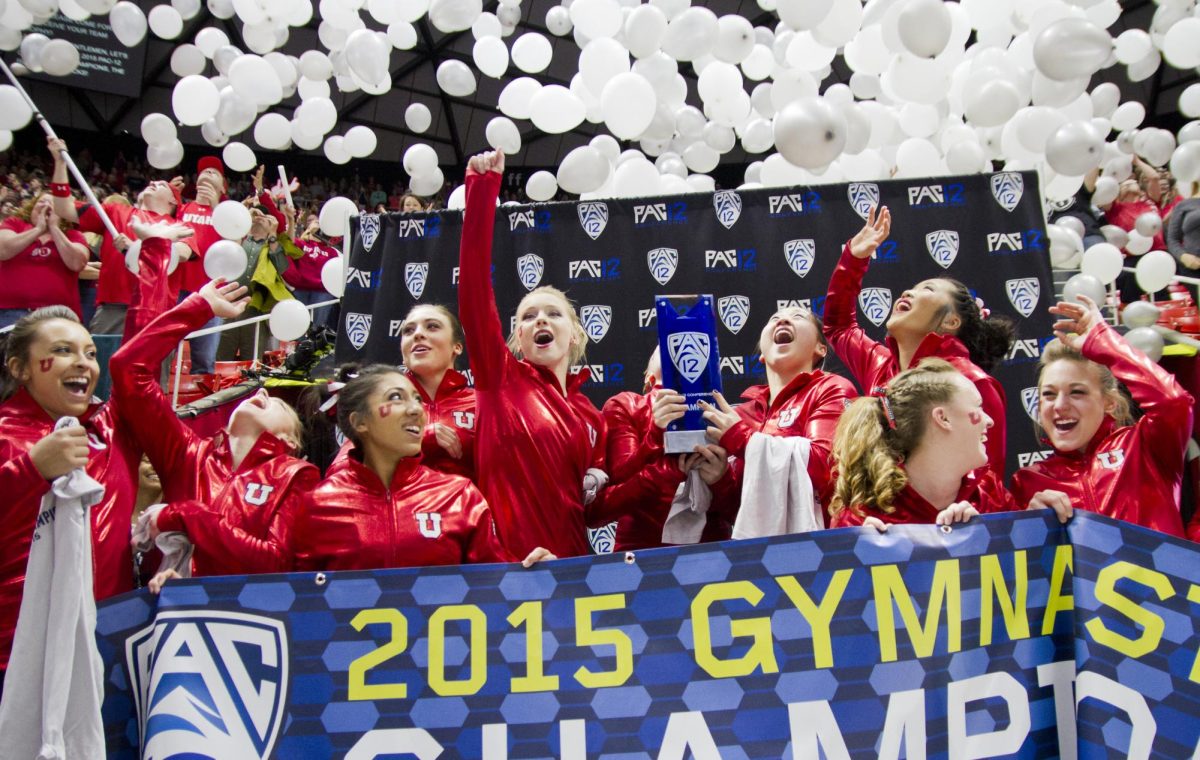In the world of gymnastics, the Marsden name is synonymous with success and accomplishment. Any mention of it earns remarks of respect and awe — a testament to the level of prosperity Head Coach Greg Marsden invoked during his 1976-2015 reign.
Athletes and Accolades
Prior to Marsden’s hiring in ‘76, the realm of gymnastics in Utah was bleak; there was no official University of Utah gymnastics team to begin with, despite the sport growing in popularity all around the country. Support for women’s sports was meager, let alone encouraged or nurtured. Gymnastics viewership was laughable at best, and it was tough to draw a crowd that would remain engaged. However, with the arrival of Marsden, the U’s gymnastics program was born and quickly fell into a whirlwind, and soon Marsden had the team rising through the ranks.
Building a solid fan base and establishing support for the new women’s program was at the forefront of Marsden’s priorities after being instated as the official head coach in 1976. With no time to waste, the former college athlete began making improvements to the program. With little gymnastics experience under his belt, Marsden moved to hire help ranging from strength training coaches to build athleticism to full-fledged meet directors to help put on a real production. Improvements were made to the events themselves and included features like fireworks and live announcers, something that was unheard of at the time for college gymnastics.
With the newly added help on top of a freshly restructured program, the Utah gymnasts began to advance in a way never seen before. The Utes — not called the Red Rocks until the early ’90s — shot up the national ranks in their second season, claiming the tenth-best spot in the country. A few short years passed until 1981, when finally Utah stood on the top of the podium at the AIAW National Championships, marking their first major title only five years after Marsden came on the scene.
Following unprecedented success in Marsden’s early years, the Utah gymnastics program subsequently began a period of thriving and growth that would last four decades. In that time, the team claimed ten national titles and attracted national attention to both the Utah program and gymnastics as a whole. And through all of the recognition, Marsden was able to draw the attention of not only fans but athletes all around the country.
To add to the superhuman list of innovations and accomplishments completed by Marsden, the head coach was also one of the first to expand recruiting efforts and sign athletes from all over the United States. In doing so, Marsden landed several premier gymnasts — including seven Olympians — that would go on to become household names.
One of those athletes, Missy Marlowe, transformed into one of the best-decorated gymnasts at the time and in all of University history. Not only was Marlowe a member of the 1988 U.S. Olympic team in Seoul, South Korea, but she racked up a number of accolades that few gymnasts would be able to top. These include five NCAA championship titles and the immense honor of receiving the Honda-Broderick Cup, an award that is given to the best female collegiate athlete — not just gymnast — in the country.
Another notable athlete who was brought on by Marsden and is also a Utah legend was Theresa Kulikowski. The 1996 US Olympic Alternate delivered not only athletic prowess to the team but academic prowess as well. On top of her three National titles and 14 All-American honors, Kulikowski added multiple Academic All-American honors to the list and was the first gymnast ever to be awarded the CoSIDA Academic All-American of the Year in 2003. The award is presented to any athlete, male or female, in the NCAA for top academic performance, which Kulikowski earned with a 4.0 GPA.
Undeniably, Marsden revolutionized gymnastics in Utah and was able to confidently build a thriving empire that still stands today. However, on top of his impressive legacy here at the U, any story on the legendary head coach is not complete without mention of his national and international endeavors. Needless to say, the gymnastics world will remain indebted to Marsden’s efforts for many years to come, without which the sport would not have advanced.
Impact
Marsden revolutionized the sport of gymnastics, leading the team to the highest average attendance for collegiate women’s sports during his 40-year tenure as coach. Unsatisfied with the media coverage the team was getting in the early years, Marsden slowly changed the sport. He looked to improve low attendance by looking at sports that drew crowds, primarily football and basketball. Marsden soon realized that gymnastics meets were slow and often hard to sit through in comparison.
Marsden told ESPN, “We set to create a fast-moving, tight package that would keep people interested if they came to a meet.”
By bringing in the band, cheerleaders, fireworks and numerous other attractions, Marsden changed slow meets into exciting performances. The Red Rocks averaged 14,950 fans in his final year coaching, with the final regular-season home meet recording 16,019 fans, both a Huntsman Center and NCAA record. Attendance continued to climb after his tenure, with 2020 attendance averaging 15,273, the third season that average attendance eclipsed the 15,000 mark, once again setting a NCAA record.
Marsden didn’t only revolutionize gymnastics at the U, but throughout the nation. In 2014, three gymnastics programs held spots in the top five in attendance throughout all of women’s collegiate sports, with Utah holding the top spot.
Marsden not only built Utah into a powerhouse in collegiate gymnastics, he helped popularize the sport. There was very little fan interest in the early days, but the sport has blown up. The Red Rocks finished the 2020 season averaging more attendance than all 12 WNBA teams did in 2019. In fact, the only collegiate or professional women’s team that averaged more than Utah’s gymnastics team was the Portland Thorns FC.
Marsden finished his career with seven National Coach of the Year awards, rightly deserved. He finished as the winningest coach in college gymnastics history with a record of 1048-208-8. In the 34 years that the NCAA Championship existed during Marsden’s tenure, Utah was the only collegiate team to qualify in all 34 years.
With Marsden’s retirement, his wife Megan Marsden and assistant coach Tom Farden stepped in as co-head coaches. The two coached the team through 2019, when Farden stepped up as head coach.
In his four years as head coach, Farden has led the team to four straight Pac-12 Regular Season Championships, three Pac-12 Championships and appearances at three NCAA Championships. Farden has also extended Utah’s streak of national championship qualifications, hitting their 47th consecutive appearance in 2023.
However, the program has fallen under scrutiny, with Farden being recently investigated for abuse after allegations from several former athletes. Olympian Kara Eaker announced her retirement from the U’s team and gymnastics as a whole, citing abuse from an unnamed coach, and was supported and echoed by former U gymnast Kim Tessen, who named Farden as an abusive coach.
Multiple others transferred out of the program before the allegations were made. Jillian Hoffman and Cammy Hall both transferred to LSU’s team as grad students, with undergraduates Sage Thompson and Lucy Stanhope transferring to Oregon State and Nebraska, respectively, to finish their careers.
Amidst all of the turmoil surrounding the program, the only focus can be on the upcoming season. The Red Rocks begin their season on Dec. 15 with the Red Rocks Preview before facing Boise State on Jan. 5. Both meets will be in the Jon M. Huntsman Center at 7:00 p.m. MST.
The Red Rocks will also host ESPN’s first-ever Invitational, at the Maverik Center in West Valley City. The Invitational will feature three of last year’s Final Four teams — Utah, LSU and Oklahoma — and UCLA.




